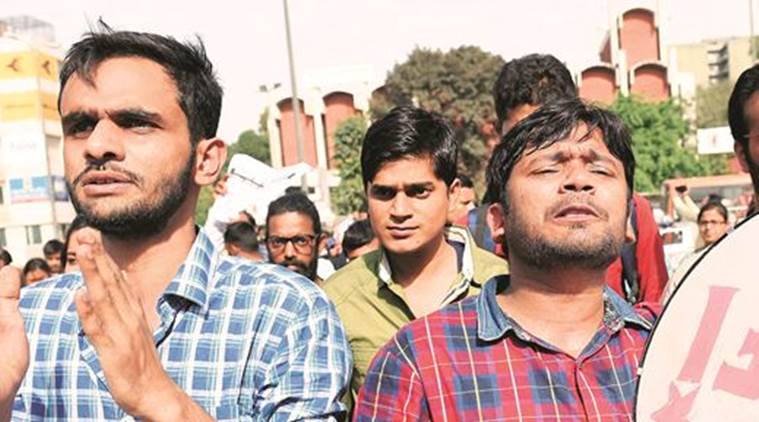
By Lara Jesani
Election fervor has gripped the country and political parties across the board are busy making election promises to lure voters. The latest to hit the news and become a campaign agenda, is the draconian colonial era sedition law under Section 124A of the Indian Penal Code, 1860 (IPC).
The controversial sedition law has been increasingly used under the current regime to target students, journalists, lawyers, activists, even social media users, for criticizing the government and opposing its policies. From the infamous arrest of JNU students Kanhaiya Kumar, Umar Khalid and Anirban Bhattacharya in February 2016 to the recent arrests of activists and workers in the Bhima Koregaon violence case, the criminalization of activists opposing the Citizenship Bill to the arrest of Advocate Thirumurugan Gandhi for exposing the government’s role in the Tuticorin police firing, it has been rampantly used to clampdown on freedoms, stifle dissenting voices and target defenders.



In a major crackdown on internet freedoms, civilians have been arrested and booked on the charge sedition from across India for posting allegedly “anti-national” comments on social media following the Pulwama suicide attack in February 2019. See examples here, here and here.
The ruling party at the Centre has been facing severe flak from civil liberties activists, international bodies and proponents of democratic rights, for its alarming use of the sedition law to strip people of their constitutional freedoms of speech and expression and right to dissent in a democracy.
Only last week, the Delhi government submitted that the Delhi Police filed a chargesheet in the JNU sedition case in haste and secretly without getting the sanction of the competent authority. The government also told the court that it will take one more month to decide whether to grant sanction or not in the case.
The Delhi government’s submission came before Chief Metropolitan Magistrate Deepak Sherawat, who listed the matter for further hearing on April 8.
Sensible judges do take a stand against sedition charges, as happened in the case of Manipur journalist Kishorechandra Wangkhem, when a magistrate’s court rejected sedition charges against him. But the vindictive face of the state asserted itself, as he was ordered to be in detention under the more draconian National Security Act (NSA) for one year, till April 8, when the Manipur High Court stepped in to order his release!
Party manifestoes to remove sedition…
In a latest and path breaking development for civil liberties in the country, several opposition parties, including many who themselves used this archaic law when in power, have in their manifesto for the 2019 elections included a promise to repeal the sedition law. In its recently released party manifesto Congress party has promised to “omit Section 124A that has been misused and, in any event, has become redundant because of subsequent laws”.
Left parties such as Communist Party of India (CPI), Communist Party of India, Marxist (CPM) have also assured the repeal of sedition law in their respective party manifestos. Aam Aadmi Party (AAP) will be releasing its manifesto on April 25 and it remains to be seen whether it will address sedition and how.
…or strengthen it!
Meanwhile riding on nationalistic fervor as the prime agenda for its election campaign, BJP has promised to make sedition law more stringent.
Immediately upon release of the Congress party’s manifesto, BJP leaders initiated a vitriolic campaign against Congress party supremo Rahul Gandhi, calling this promise an allegiance to traitors, jihadists and terming the party “anti-national”, inspite of the fact that the NDA government has itself used the law mainly against Indian civilians and protestors.
Latest reports suggest that a criminal complaint has been filed against Rahul Gandhi before a Chief Judicial Magistrate in Agra by an advocate Narendra Sharma, for promising removal of sedition law, which will come up for hearing on April 16.
Colonial vestige
The British introduced the offence of sedition in the IPC in the year 1870, to trample opposition to its colonial rule, to curb free speech and silence criticism and to arrest writers, thinkers and leaders in the independence struggle. Section 124A of the IPC reads as-
“Whoever, by words, either spoken or written, or by signs, or by visible representation, or otherwise, brings or attempts to bring into hatred or contempt, or excites or attempts to excite disaffection towards the Government established by law shall be punished with imprisonment for life, to which fine may be added.”
However, even after achieving independence and declaration of the Indian Republic as a democracy, the sedition law was not scrapped as many other such colonial laws and continued to be used by the ruling parties to silence voices of dissent and political opposition.
Meanwhile, the British themselves repealed the sedition law in 2009. This was closely followed by the offence of sedition being removed by Commonwealth countries like Uganda, Kenya, Australia and Scotland. New Zealand, whose government has recently been in the news for displaying political maturity and exemplary courage in the face of a vicious terrorist attack by a white supremacist on two mosques in Christchurch, which led to the killing of 50 Muslims, repealed the sedition law in 2007. South Korea did away with Sedition law in 1988. Similarly most of the developed world has removed the offence of sedition from their legal jurisprudence or limited its use entirely or drastically. India stands with countries like Iran, Sudan and Saudi Arabia in retaining a law on sedition.
The scope of Section 124A was limited in the year 1962 by a five-judge constitutional bench of the Supreme Court in the matter of Kedarnath Singh vs. State of Bihar, which clarified that the offence would be attracted only if the speech is an ‘incitement’ to ‘violence’, or ‘public disorder’. However, this has been glaringly ignored at the stage of filing cases.
With the delayed trials and dismal conviction rates, the real punishment in a case of sedition is not the offence itself but the process of incarceration, criminalization and harassment that is successfully and purposefully used as a tool of state repression.
Promises to keep
As we wait with bated breath for polling day, we cannot forget our role as citizens to uproot outdated and repressive laws, which are used for the sole purpose of curbing our democratic rights and constitutional freedoms. While the promise to remove sedition law is a step in the right direction, it is our very citizenship rights to vote, to protest and demand fulfilment of this promise that will pave the way for this long due democratic legislative reform. Its definitely time to repeal sedition!
(Lara Jesani is a Mumbai-based lawyer and human rights activist)


